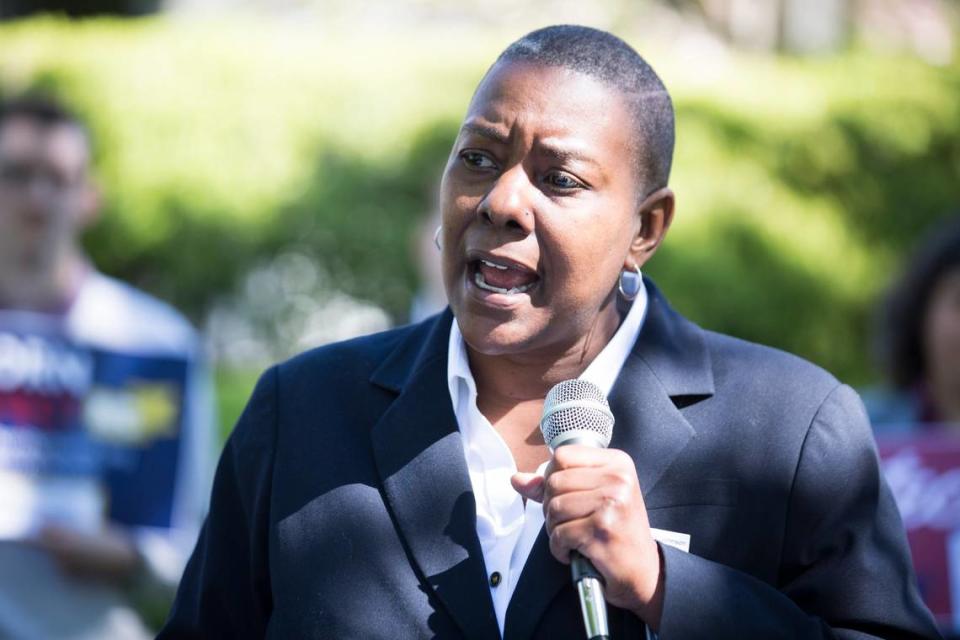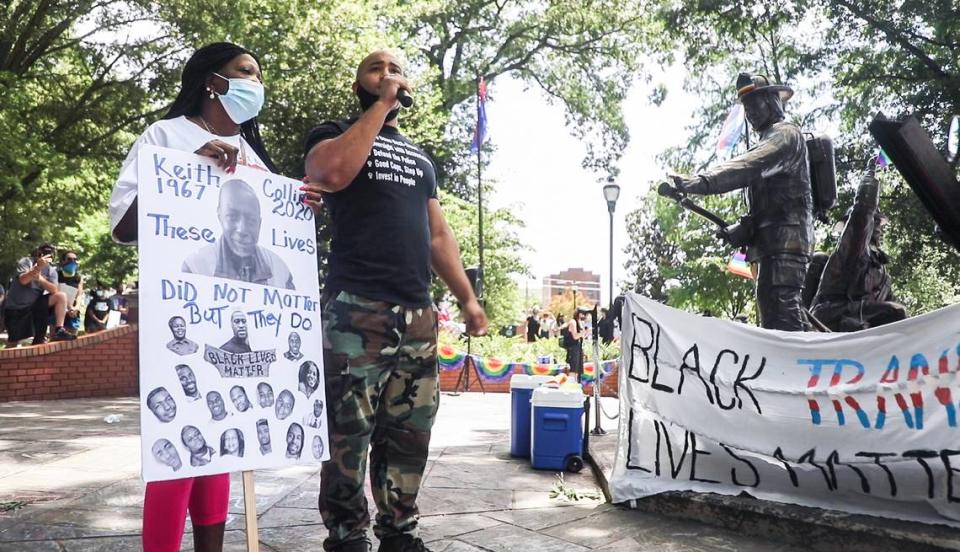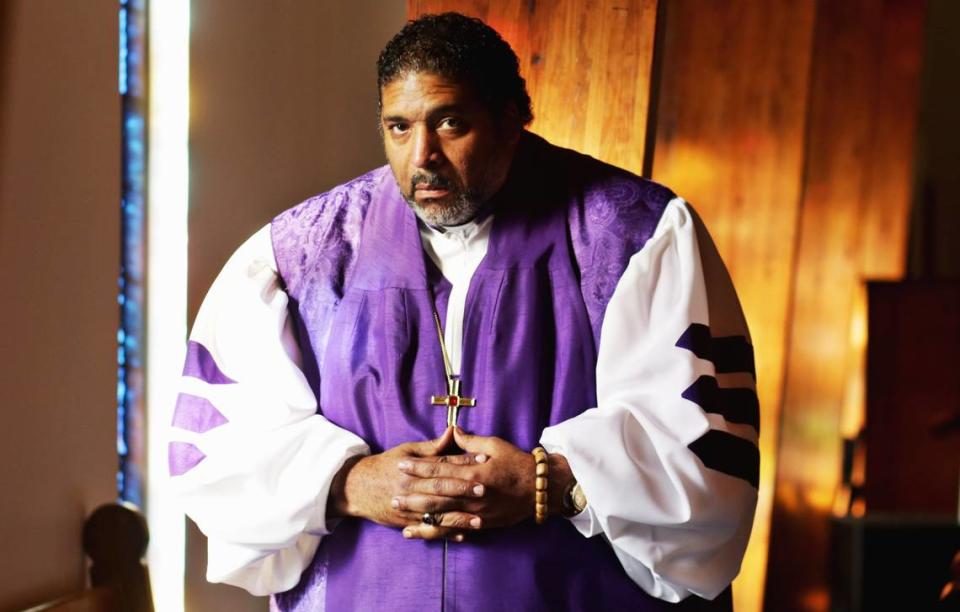Black lives matter, LGBTQ groups find common ground in fight against police brutality
Last Sunday, two groups of protesters planned gatherings in two downtown Raleigh parks, both working to draw attention to police brutality against minority groups.
One gathering was by protesters mostly focused on the concerns of LGBTQ people. The other was by protesters who have been fighting racial discrimination against Black people.
By the end of the day, the two groups had merged together to march as one.
“We don’t need to be two separate groups marching at the same time,” activist Kerwin Pittman said later, explaining the confluence. “We’re fighting for the same cause.”
Protests that began after George Floyd died while being restrained by Minneapolis police on May 25 have drawn millions of people into the streets who, for a range of reasons, identify with or support the push against police brutality and systemic racism. In the Triangle, LGBTQ activists and those fighting racism — two groups that have sometimes been divided by philosophical differences — are now coming together to push for the same kinds of social change.
“In many ways, for the LGBTQ community, this is going back to our roots,” said Kendra Johnson, executive director of Equality North Carolina, which has pushed for decades for rights and protections for lesbian, gay, bisexual, transgender and queer people.
Those roots are the 1969 riots and protests that became known as the Stonewall Uprising, a fight against the practice by New York police of the day to raid gay bars and harass and arrest patrons. The uprising was led by Black and Brown trans women and drag queens, including Marsha P. Johnson, alongside other members of the LGBTQ community.

Natural to join forces
Some have said that as communities of color plead for or demand more equitable treatment by law enforcement, it’s time for the LGBTQ community to return the favor.
Johnson sees it as only natural to join forces, because of the overlap of issues but also the layering of identities that lead to multiple forms of discrimination. Johnson is a Black lesbian and says she has experienced prejudice based on her race, her gender and her sexual orientation.
“We’ve been creating space where we try to look at how multiple oppressions affect our lives, and the LGBTQ community is a part of every community,” she said. “And we can’t do our work without also considering how race plays a role in the lives of people in our community.”
In the past, LGBTQ people have not always felt comfortable in the Black community, even among groups advocating for people of color, because of a longstanding bias against LGBTQ people.
Pittman, who helped organize the Raleigh Demands Justice coalition to help push for police reform, said he has learned recently that LGBTQ people of all races continue to be victims of police harassment.
“As a straight Black male, I wanted other straight Black males to see that it’s OK to support these individuals fighting against police brutality,” he said.
Pittman, who plans to attend UNC Greensboro in the fall, said he helped organize the first protest in Raleigh that followed Floyd’s killing. While his group is not affiliated with the national Black Lives Matter organization, he said he wanted to give everyone — Blacks, LGBTQ people and allies of all races and ethnicity — a chance to show they agree with the sentiment that Black lives matter.
“When it comes to brutality, and especially police brutality, we are all the same,” Pittman said. “If you are LGBTQ and injustice is being done to you, I’m going to be there to push as hard for you as if you are someone who is straight. Because at the end of the day, I’m a part of your community and you’re a part of mine.
“When we say Black lives matter, we’re not saying only straight Black lives matter. We’re saying Black lives matter.”

Bringing marginalized people together
Rev. William Barber II, pastor at the open and affirming Greenleaf Christian Church in Goldsboro, an organizer of the Moral Monday marches in North Carolina and co-founder of the national Poor People’s Campaign, has preached for years that reforming political and social systems in the state and across the country will require marginalized people to come together.
Barber’s Moral Monday coalition came out against the state’s ban on gay marriage and against HB2, known as “the bathroom bill,” which barred transgender people from using public facilities designed for their gender identity.
The Poor People’s Campaign has a five-part platform:
▪ ending systemic racism and ensuring equal protection under the law.
▪ the right to an adequate standard of living.
▪ the right to work with dignity.
▪ the right to health and a healthy environment.
▪ reduced spending on militarization and increased spending to close the racial wealth divide.
Barber often points out that policies that would help poor people would, in raw numbers, aid more white people than Blacks or Hispanics — and that the whole society would benefit.
Sometimes, advocates say, groups with similar interests don’t work together because they disagree on tactics or on which are the most pressing problems at the moment.
Right now, Barber said, LGBTQ people and Blacks who feel at risk for maltreatment by police both are asking for equal protection under the law.
That’s guaranteed by the 14th Amendment of the U.S. Constitution, and Barber believes that all citizens have an interest in seeing that it’s upheld.
“If you pass a law that undermines equal protection under the law for any group, it puts every group at risk,” Barber said. “Either the establishment of justice applies to all, or it applies to none. That has always been the struggle of our democracy: people who wanted to take the principles of our founding documents and limit them to only some people. They started with only white people who owned land. We have to resist that limitation in every way.”

‘Build a creative culture’
Elijah King, 19, has spent much of the past couple of months organizing meals for people in Durham who might otherwise struggle to find food as a result of being un- or under-employed since COVID-19 hit. He also has been working to bring attention to reports of police violence and advocating for the Durham Public Schools to remove police officers from schools and to replace them with mental health counselors trained to work with youth.
King, who identifies as queer, said one of the reasons he volunteers with several different groups is that, “There are not many people speaking up for us who look like us.”
When groups work together for common goals, he said, it’s important to have broad representation.
Johnson, of Equality NC, agreed.
“You build a creative culture where people feel welcome,” she said. “And you do that by talking about the issues that impact their lives.”
The size of protests and marches has shrunk in the past couple of weeks as some who crowded the streets and sidewalks early on have returned to work or other obligations, or found other ways to address what they see as problems.
Those who remain in the movements say they are rejuvenated.
“I think the most encouraging thing is that people are actually talking about these issues in a different way,” Johnson said. “That’s not to say that some of the fear around the statement ‘Black lives matter’ has just disappeared. We still have the ‘All lives matter’ crowd that is trying to shout down the ‘Black lives matter’ crowd. But we’re having a broader discussion, and we’re having people see that their issues are interconnected.
“And that’s when we have the greatest potential for culture change.”

